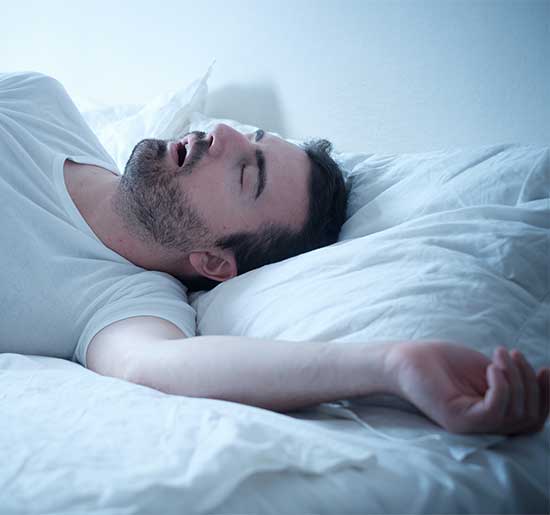Leading Care for Sleep Apnea in Scottsdale, AZ
Sleep Apnea Services in Scottsdale, AZ FAQ
When you have obstructive sleep apnea, your breathing repeatedly stops while you sleep. Patients with a mild case stop breathing 5-15 times every hour. However, you can stop breathing 30 times or more per hour if your sleep apnea is severe.
When you go to sleep, the soft tissues in your mouth and throat relax. As a result, your tongue slides toward the back of your throat, where it can cover the airway and prevent you from breathing.
The rapid drop in oxygen alerts your brain, which nudges you awake just enough to start breathing again.
Children with sleep apnea often have enlarged tonsils and adenoids that block the airway. Nasal polyps or other nasal obstructions can also lead to sleep apnea.
Patients with sleep apnea have symptoms such as:
- Loud snoring
- Daytime fatigue
- Morning headache
- Suddenly waking and gasping for breath
- Difficulty with memory or concentration
- Frequently going to the bathroom at night
Loud snoring is the most common symptom of sleep apnea. Your partner or others in the house often hear a cycle of loud snoring, then silence when you stop breathing, followed by a sudden gasp when you start breathing again.
When Dr. Gergits suspects you have sleep apnea, he orders a sleep study, which is the only way to diagnose the problem.
During a sleep study, you wear sensors that measure your breathing, air flow, and oxygen levels while you sleep. This information shows whether you stop breathing and how often.
Once Dr. Gergits knows the severity of your sleep apnea, he can recommend customized treatment. Underlying conditions such as polyps or enlarged tonsils are treated first.
Patients who are overweight and have mild sleep apnea may stop their apnea by losing weight. Otherwise, sleep apnea is treated with:
Continuous positive airway pressure (CPAP)
CPAP is the preferred treatment for moderate-to-severe sleep apnea. This device keeps your airway open by delivering constant air pressure through a mask.
Oral appliance
This is a custom-fitted device that’s like a mouthguard. When you wear it at night, it holds your jaw and tongue slightly forward, which prevents your tongue from covering the airway.
Untreated sleep apnea causes serious problems such as high blood pressure and heart arrhythmias, so don’t wait to schedule an appointment if you suspect you have the condition. Call Sinus & Allergy Wellness Center or book an appointment online.

What Is Sleep Apnea?
Sleep apnea is a sleep disorder characterized by pauses in breathing or shallow breathing during sleep. These interruptions can last for seconds to minutes and occur multiple times throughout the night. There are two different types of sleep apnea: obstructive sleep apnea (OSA), which results from the relaxation of throat muscles blocking the airway, and central sleep apnea (CSA), where the brain fails to send the proper signals to the muscles that control breathing. Symptoms of sleep apnea include loud snoring, gasping for air during sleep, daytime fatigue, and difficulty concentrating. Sleep apnea can lead to serious health issues if left untreated, so timely diagnosis and appropriate management are crucial for improving sleep quality and overall health.
What Are the Types of Sleep Apnea?
There are two main types of sleep apnea: obstructive sleep apnea and central sleep apnea. Obstructive sleep apnea is the more common form and occurs when the throat muscles relax, causing a blockage of the airway during sleep. Central sleep apnea, on the other hand, is less common and results from the brain failing to send the proper signals to the muscles responsible for breathing. Both types of sleep apnea can cause interruptions in breathing during sleep, leading to daytime fatigue and other health issues. Proper diagnosis and treatment are essential for managing sleep apnea effectively.

Sleep Apnea Symptoms
Sleep apnea symptoms include loud and chronic snoring, gasping or choking sounds during sleep, pauses in breathing, and restlessness during the night. People with sleep apnea often experience excessive daytime sleepiness, morning headaches, and difficulty staying asleep. They may also have trouble concentrating, memory problems, and mood changes. Sleep apnea can impact the quality of life, leading to fatigue, irritability, and reduced productivity during waking hours. If you or someone you know experiences these symptoms, it is essential to seek medical evaluation for proper diagnosis and appropriate treatment.
Sleep Apnea Treatment Options
Sleep apnea treatment options aim to improve breathing during sleep and alleviate symptoms. For mild cases of obstructive sleep apnea, lifestyle changes such as weight loss, positional therapy, and avoiding alcohol and sedatives before bedtime may be recommended. Continuous positive airway pressure (CPAP) therapy is a common treatment that involves wearing a mask during sleep to deliver a steady stream of air and keep the airway open. Other therapies include bilevel positive airway pressure (BiPAP), oral appliances, and adaptive servo-ventilation (ASV). In more severe cases — or when other treatments are not effective — surgery may be considered to address anatomical obstructions. Treatment options should be tailored to each individual’s specific needs, and regular follow-up with healthcare providers is essential to monitor progress and adjust the treatment plan as needed.
Contact Sinus & Allergy Wellness Center Today
Ready to take control of sleep apnea and improve your nights? At Sinus & Allergy Wellness Center, our specialized team offers personalized, clinically recognized treatment options tailored to your needs — from CPAP therapy to oral appliances and more. If sleep apnea is affecting your daily life, schedule a consultation to explore which treatment options may help and begin building a care plan that works for you. Rest, breathe, and live better with us.



